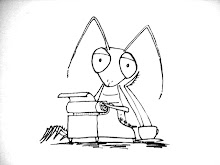Dirge For The Proud World
by Thomas Merton
Where is the marvelous thief
Who stole whole harvests from the angry sun
And sacked, with his bright sight, the land?
Where he lies dead, the quiet earth unpacks him
And wind is waving in the earth's revenge:
Fields of barley, oats, and rye.
Where is the millionaire
Who squandered the bright spring?
Whose lies played in the summer evening sky
Like cheap guitars?
Who spent the golden fortunes of the fall
And died as bare as a tree?
His heart lies open as a treasury,
Filled up with grass and generous flowers.
Where is the crazy gambler
Amid the nickels of whose blood have fallen
Heavy half dollars of his last of life?
Where is he gone?
The burning bees come walk, as bright as jewels
Upon that flowering, dark sun:
The bullet wound in his unmoving lung.
Oh you who hate the gambler or his enemy,
Remember how the bees
Pay visits to the patient dead
And borrow honey from their charitable blood.
You who have judged the gambler or his enemy
Remember this, before the proud world's funeral.
***************
Remember, O Man, that you are dust, and unto dust you shall return. With these words from Genesis we mark the beginning of Lent on Ash Wednesday. As a boy I never cared for Lent. I always thought of what I would be giving up, often candy or sweets: the candy that would become infinitely more desirable in the moment of renouncing it. I thought of fasting and abstinence, confession and penance. The whole thing seemed to add gloom to the dreariest part of the year.
Certainly all of these things are part of traditional Lenten observance. Just as certainly, I had made a mistake in emphasizing them. At best they are only half of it, probably less than that. It took me years to see the beauty in Lent: to see something of its true purpose. Truly we are dust, and to the dust we shall return. That is our fate. Yet these words point not only to our insignificance, but also to our importance: to the absolute miracle that we are here at all.
Think of it: you and I and everything around us: dust, yet what wondrous dust. The stark beauty of trees in winter, a barren field, a frozen waterfall: all dust, yet what becomes of this dust in the hands of the Lord. Look into the eyes of a child: all dust, yet how clearly we see the Light reflected in them. We are surrounded by miracles, called forth from the dust.
Our Lenten practices are not an end in themselves, but a means to an end. Like pruning a vine, they strengthen us and prepare us for new growth. We pray not because God needs our prayers, but because we need to offer them. Why fast? Because you will learn things you cannot learn any other way. Like spring cleaning, Lent is a time to clear away the clutter of our lives and make room for what is truly important. We strip away all that is useless to seek the essence of our souls.
Where is the thief, the millionaire, the gambler? They have returned to the dust. What has become of their souls is not for us to judge, but Merton shows clearly what has become of their dust. It has been made new: transformed into fields of grain, beautiful flowers, sweet honey. Remember this, Merton tells us. Remember this.
Remember, O Man, that you are dust, and unto dust you shall return. Yes, we are dust. One day we shall return to the dust. That is the way of it. Yet miracles have been brought forth from the dust: beauty, love, life itself: all dust, but dust in the hands of the Lord who makes all things new.
Remember that you are dust: not in fear, but to better see the miracles that surround us. Absolute miracles, called forth from mere dust.
Respectfully Yours,
Cricket










